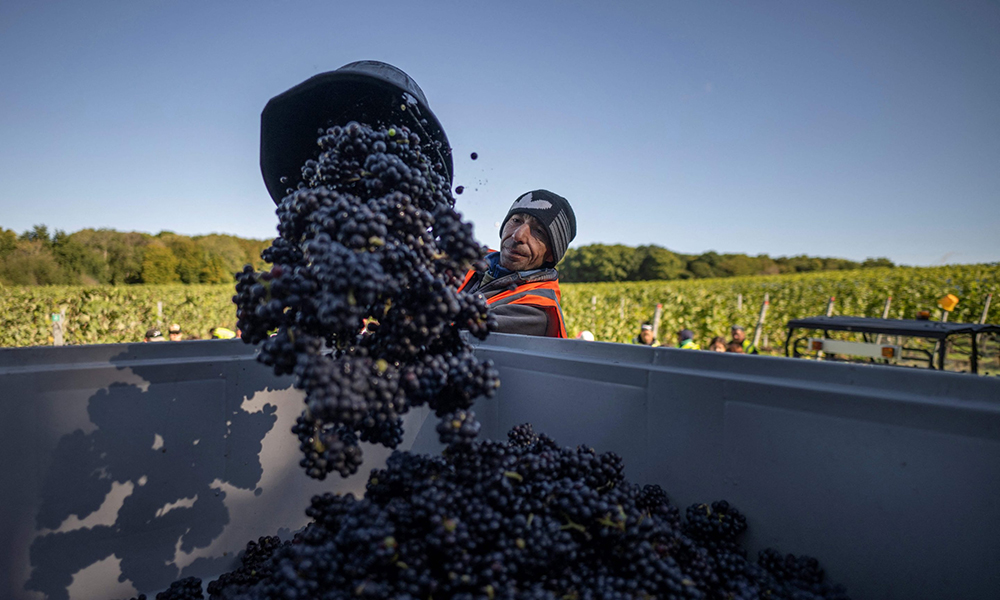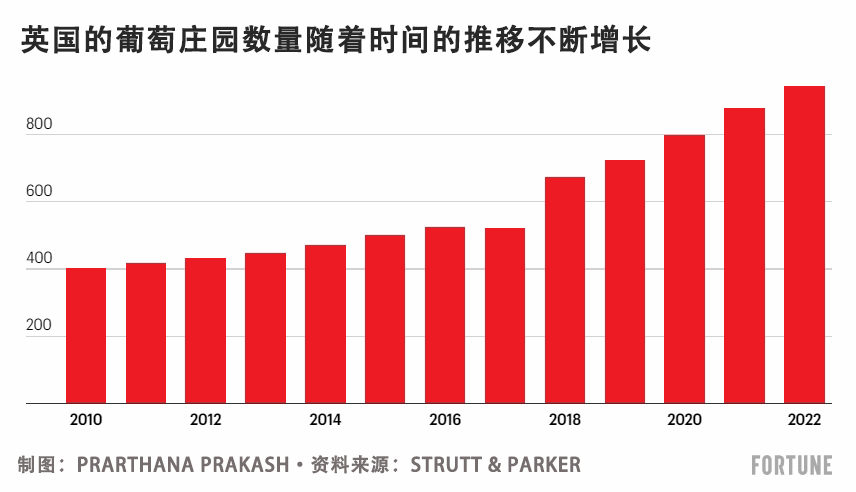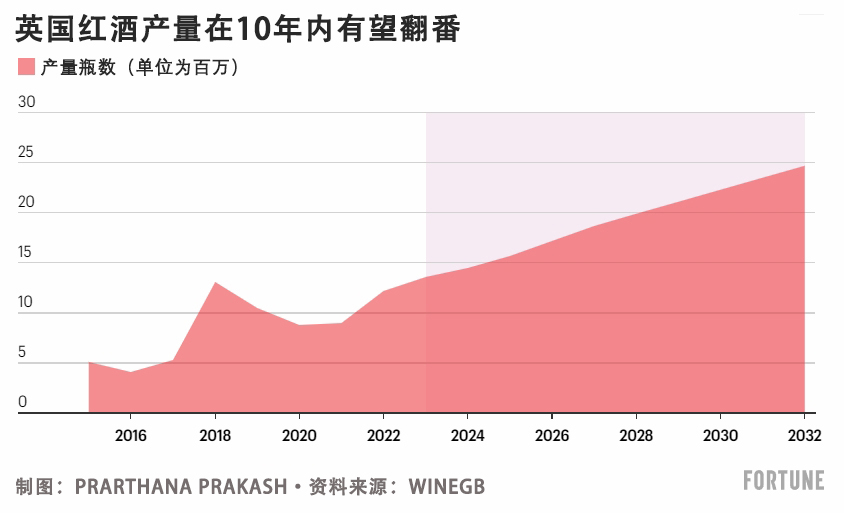
受氣候變化影響,,今年將成為歷史上氣溫最高的一年,這一現(xiàn)象對(duì)于那些沒(méi)有能力加大投入并采取行動(dòng)規(guī)避的行業(yè)帶來(lái)了巨大的沖擊,,例如葡萄酒釀造行業(yè),。由于極端天氣影響了葡萄的產(chǎn)量和品質(zhì),在那些因?yàn)獒勗烊蛑咸丫贫L(zhǎng)期處于主導(dǎo)地位的產(chǎn)區(qū),,比如意大利,,產(chǎn)酒量均出現(xiàn)了下滑。
在葡萄酒行業(yè)格局開(kāi)始變化之際,,有一個(gè)國(guó)家成為了出人意料的贏家,。英國(guó)的葡萄種植歷史十分悠久,有人估計(jì),,其種植史能夠追溯至11世紀(jì),。然而,該國(guó)始終未能像其歐洲同行一樣,,提供更高品質(zhì),、更多種類(lèi)的葡萄酒,并借此躋身葡萄酒大國(guó)的陣營(yíng),。英國(guó)并不怎么理想的葡萄酒種植環(huán)境是該現(xiàn)象背后的原因之一,。
然而,隨著全球溫度的上升,,英國(guó)的氣候條件變得更加適合種植某些葡萄品種,,也為該國(guó)處于擴(kuò)張中的葡萄酒行業(yè)帶來(lái)了機(jī)會(huì)。更暖和的天氣讓英國(guó)葡萄的成熟度更高,,繼而提升了葡萄酒的品質(zhì),。
Gusbourne Estates的營(yíng)銷(xiāo)總監(jiān)喬納森·懷特在接受《財(cái)富》雜志采訪時(shí)表示:“從歷史上看,英國(guó)葡萄酒普及度并不高,,而且口碑也不是很好,。”Gusbourne Estates在肯特郡和西薩塞克斯郡有葡萄莊園,。這些莊園有著近20年的葡萄種植史,。
他說(shuō):“英國(guó)葡萄酒的品質(zhì)往往并不是很好,而且也不是由專(zhuān)業(yè)釀酒人士或優(yōu)秀和懂行的葡萄栽培者生產(chǎn),?!睉烟剡€表示,不過(guò),通過(guò)種植合適的葡萄品種組合,,再加上更暖和的天氣,,英國(guó)葡萄酒釀酒行業(yè)又重新引起了業(yè)界的重視。
英國(guó)房地產(chǎn)咨詢(xún)公司Strutt & Parker的葡萄種植負(fù)責(zé)人尼克·沃森在6月的一份報(bào)告里寫(xiě)道:“對(duì)英國(guó)葡萄酒行業(yè)的興趣達(dá)到了有史以來(lái)的最高峰,,在過(guò)去12個(gè)月中,,我們收到的有意購(gòu)買(mǎi)酒莊或設(shè)立新酒莊的電話數(shù)量是之前的三倍,?!?/p>
該集團(tuán)發(fā)現(xiàn),英國(guó)葡萄莊園的數(shù)量在過(guò)去六年里增長(zhǎng)了80%,,達(dá)到了900多座,,而葡萄栽種英畝數(shù)亦出現(xiàn)了類(lèi)似的增幅。即使這一數(shù)字無(wú)法與歐盟的一些葡萄酒首要產(chǎn)區(qū)相比,,但在這個(gè)長(zhǎng)期以來(lái)被一眾老牌強(qiáng)國(guó)所主導(dǎo)的行業(yè)中,,英國(guó)正在開(kāi)創(chuàng)自己的一片天地。

快速增長(zhǎng)
氣候變化對(duì)葡萄酒行業(yè)的影響是漸進(jìn)式的,,同時(shí)也是翻天覆地的,。例如在法國(guó),近幾年來(lái)多變的天氣模式一直在重塑著葡萄酒行業(yè),,也改變了所產(chǎn)葡萄的品質(zhì),。今年10月,歐洲農(nóng)業(yè)游說(shuō)團(tuán)體Copa-Cogeca發(fā)布的數(shù)據(jù)顯示,,葡萄牙和意大利的葡萄產(chǎn)量分別下滑了8.6%和11.92%,。
(不過(guò),不用擔(dān)心葡萄短缺問(wèn)題,。長(zhǎng)期以來(lái),歐洲葡萄酒一直處于過(guò)剩狀態(tài),,也就是“酒?!眴?wèn)題。今年,,法國(guó)政府稱(chēng),,該國(guó)將耗費(fèi)2億美元來(lái)銷(xiāo)毀過(guò)剩的葡萄酒,并把收益讓渡給飽受葡萄酒價(jià)格和需求下跌折磨的釀酒商,。)
盡管氣候變化并不是什么好事情,,但一些地區(qū)葡萄酒產(chǎn)量的緩慢下滑一直讓英國(guó)受益匪淺,。葡萄酒專(zhuān)家,、咨詢(xún)公司The Wine and Climate Change Institute的創(chuàng)始人琳達(dá)·約翰遜-貝爾告訴《財(cái)富》雜志,英國(guó)如今的氣候與20世紀(jì)七八十年代的波爾多或香檳大區(qū)類(lèi)似。
她在談?wù)摦?dāng)前的這些法國(guó)產(chǎn)區(qū)時(shí)表示:“如今,,人們已經(jīng)見(jiàn)慣不怪了,每個(gè)月都會(huì)出現(xiàn)一場(chǎng)新災(zāi)難,?!?/p>
除了氣候條件之外,,法規(guī)的非正式性也為英國(guó)葡萄酒的擴(kuò)張?zhí)峁┝酥?。在葡萄酒生產(chǎn)方面,,歐洲出臺(tái)了具體的法規(guī),,包括釀造特定酒種所需使用的葡萄種類(lèi),以及氣泡酒瓶應(yīng)該使用哪類(lèi)瓶塞,。
Strutt & Parker的沃森對(duì)《財(cái)富》雜志表示:“我們并沒(méi)有這些限制,。”今年早些時(shí)候,,英國(guó)表示將取消歐盟對(duì)葡萄酒釀造的要求,稱(chēng)這些要求扼殺了創(chuàng)新,。此舉或?qū)楫?dāng)?shù)丶t酒經(jīng)濟(jì)帶來(lái)1.8億英鎊的紅利,。
沃森說(shuō):“相對(duì)于從舊世界紅酒產(chǎn)區(qū)的知名葡萄種植區(qū)購(gòu)買(mǎi)土地而言,,英國(guó)較好的種植土地更便宜,。因此,從成本門(mén)檻角度以及高品質(zhì)紅酒釀造潛力來(lái)講,,這一點(diǎn)還是非常有吸引力的,。”
行業(yè)協(xié)會(huì)WineGB的數(shù)據(jù)顯示,,英國(guó)溫度的變化對(duì)某些葡萄品種的種植而言尤為有益,,而霞多麗、黑皮諾和黑皮諾梅尼耶這三種用于制作傳統(tǒng)香檳的葡萄在英國(guó)當(dāng)前的種植面積最廣,。
雷丁大學(xué)(University of Reading)的生態(tài)系統(tǒng)科學(xué)教授馬丁·盧卡茨告訴《財(cái)富》雜志:“隨著氣候的變化,,優(yōu)質(zhì)氣泡酒如今迎來(lái)了一波機(jī)遇?!彼€指出,,這對(duì)葡萄酒業(yè)界人士來(lái)說(shuō)是一個(gè)賺錢(qián)的機(jī)會(huì),因?yàn)闅馀菥频睦麧?rùn)率要高于非氣泡酒,。
盧卡茨稱(chēng):“與任何行業(yè)一樣,,盈利是種植者生存的前提?!彼€表示,,近些年來(lái),該行業(yè)的回報(bào)引發(fā)了人們的興趣,。WineGB預(yù)計(jì),,葡萄酒產(chǎn)量在未來(lái)十年將翻一番,從2022年的1,220萬(wàn)瓶增至2032年的2,470萬(wàn)瓶,。

即便英國(guó)在主流紅酒產(chǎn)業(yè)中基本上是一名新參與者,,但它并沒(méi)有選擇角逐廉價(jià)或低品質(zhì)紅酒市場(chǎng)。The Wine and Climate Change Institute公司的約翰遜-貝爾對(duì)《財(cái)富》雜志表示,,英國(guó),、蘇格蘭和威爾士釀酒商對(duì)超市紅酒并不感興趣。
她說(shuō):“其中很多都是精釀,,他們并不希望釀造那種批量化的商業(yè)葡萄酒,。”
Gusbourne便是其中一個(gè)例子,,這個(gè)莊園始終奉行低產(chǎn)目標(biāo),,以確保其葡萄酒品質(zhì)不會(huì)下滑。
Gusbourne Estates的懷特稱(chēng):“我們異??粗氐囊稽c(diǎn)在于,,要讓葡萄酒釀造成為一種以工藝為導(dǎo)向的藝術(shù)。該莊園30%的葡萄酒出口到了35個(gè)國(guó)際地區(qū),,包括挪威,、日本和美國(guó)。英國(guó)如今也擁有多款獲獎(jiǎng)葡萄酒,?!?/p>
注重每顆葡萄樹(shù)的品質(zhì)
經(jīng)營(yíng)葡萄酒釀制業(yè)務(wù)并非易事。在收獲葡萄并將其轉(zhuǎn)化為可供消費(fèi)的葡萄酒之前,,人們需要耗費(fèi)數(shù)年的時(shí)間來(lái)看護(hù)葡萄樹(shù),。沃森指出,這項(xiàng)工作還需要大量的資本投入,,而且其成本還包括購(gòu)買(mǎi)和管理數(shù)千英畝的土地,以確保其適合種植葡萄樹(shù),。
他說(shuō):“一旦將這些標(biāo)準(zhǔn)疊加之后,,實(shí)際上適合葡萄種植的區(qū)域要比人們想象的小得多。因此,,它對(duì)現(xiàn)金流有著很大的要求,,是一個(gè)異常燒錢(qián)的產(chǎn)業(yè)。”
作為英國(guó)葡萄酒行業(yè)增長(zhǎng)的助推器,,氣候變化也在快速演變,。圍繞氣候變化對(duì)葡萄酒生產(chǎn)的影響,約翰遜-貝爾在全球各地開(kāi)展了多個(gè)項(xiàng)目,,并發(fā)現(xiàn)了一個(gè)巨大的機(jī)遇窗口,。不過(guò),有鑒于快速演變的氣候變化,,這個(gè)窗口也在不斷轉(zhuǎn)變,。
她說(shuō):“這里最大的問(wèn)題在于,適合種植某種葡萄品種的窗口期越來(lái)越短,?!彼a(bǔ)充道,她一直在建議客戶種植可以適應(yīng)更暖和天氣的葡萄品種,?!罢嬲膯?wèn)題在于如何在這一行業(yè)中未雨綢繆?!?/p>
盡管存在這些障礙,,英國(guó)葡萄酒目前卻迎來(lái)了前所未有的黃金期。葡萄酒出口以及外國(guó)對(duì)英國(guó)葡萄酒行業(yè)的興趣一直在穩(wěn)步增長(zhǎng),,而英國(guó)葡萄酒行業(yè)的知名度亦是如此,。
沃森說(shuō):“英國(guó)葡萄種植業(yè)的專(zhuān)業(yè)化水平、資本化水平以及投資規(guī)模都有了顯著提升,?!彪S著葡萄酒產(chǎn)量持續(xù)受益于氣候條件的助力,英國(guó)葡萄酒行業(yè)有望一路高歌,?!拔覀?nèi)缃褚呀?jīng)完全有能力大批量生產(chǎn)高品質(zhì)葡萄?!保ㄘ?cái)富中文網(wǎng))
譯者:馮豐
審校:夏林
受氣候變化影響,,今年將成為歷史上氣溫最高的一年,這一現(xiàn)象對(duì)于那些沒(méi)有能力加大投入并采取行動(dòng)規(guī)避的行業(yè)帶來(lái)了巨大的沖擊,,例如葡萄酒釀造行業(yè),。由于極端天氣影響了葡萄的產(chǎn)量和品質(zhì),在那些因?yàn)獒勗烊蛑咸丫贫L(zhǎng)期處于主導(dǎo)地位的產(chǎn)區(qū),,比如意大利,,產(chǎn)酒量均出現(xiàn)了下滑。
在葡萄酒行業(yè)格局開(kāi)始變化之際,,有一個(gè)國(guó)家成為了出人意料的贏家,。英國(guó)的葡萄種植歷史十分悠久,,有人估計(jì),其種植史能夠追溯至11世紀(jì),。然而,,該國(guó)始終未能像其歐洲同行一樣,提供更高品質(zhì),、更多種類(lèi)的葡萄酒,,并借此躋身葡萄酒大國(guó)的陣營(yíng)。英國(guó)并不怎么理想的葡萄酒種植環(huán)境是該現(xiàn)象背后的原因之一,。
然而,,隨著全球溫度的上升,英國(guó)的氣候條件變得更加適合種植某些葡萄品種,,也為該國(guó)處于擴(kuò)張中的葡萄酒行業(yè)帶來(lái)了機(jī)會(huì),。更暖和的天氣讓英國(guó)葡萄的成熟度更高,繼而提升了葡萄酒的品質(zhì),。
Gusbourne Estates的營(yíng)銷(xiāo)總監(jiān)喬納森·懷特在接受《財(cái)富》雜志采訪時(shí)表示:“從歷史上看,,英國(guó)葡萄酒普及度并不高,而且口碑也不是很好,?!盙usbourne Estates在肯特郡和西薩塞克斯郡有葡萄莊園。這些莊園有著近20年的葡萄種植史,。
他說(shuō):“英國(guó)葡萄酒的品質(zhì)往往并不是很好,,而且也不是由專(zhuān)業(yè)釀酒人士或優(yōu)秀和懂行的葡萄栽培者生產(chǎn)?!睉烟剡€表示,,不過(guò),通過(guò)種植合適的葡萄品種組合,,再加上更暖和的天氣,,英國(guó)葡萄酒釀酒行業(yè)又重新引起了業(yè)界的重視。
英國(guó)房地產(chǎn)咨詢(xún)公司Strutt & Parker的葡萄種植負(fù)責(zé)人尼克·沃森在6月的一份報(bào)告里寫(xiě)道:“對(duì)英國(guó)葡萄酒行業(yè)的興趣達(dá)到了有史以來(lái)的最高峰,,在過(guò)去12個(gè)月中,,我們收到的有意購(gòu)買(mǎi)酒莊或設(shè)立新酒莊的電話數(shù)量是之前的三倍?!?/p>
該集團(tuán)發(fā)現(xiàn),,英國(guó)葡萄莊園的數(shù)量在過(guò)去六年里增長(zhǎng)了80%,達(dá)到了900多座,,而葡萄栽種英畝數(shù)亦出現(xiàn)了類(lèi)似的增幅,。即使這一數(shù)字無(wú)法與歐盟的一些葡萄酒首要產(chǎn)區(qū)相比,但在這個(gè)長(zhǎng)期以來(lái)被一眾老牌強(qiáng)國(guó)所主導(dǎo)的行業(yè)中,,英國(guó)正在開(kāi)創(chuàng)自己的一片天地,。
快速增長(zhǎng)
氣候變化對(duì)葡萄酒行業(yè)的影響是漸進(jìn)式的,同時(shí)也是翻天覆地的,。例如在法國(guó),,近幾年來(lái)多變的天氣模式一直在重塑著葡萄酒行業(yè),也改變了所產(chǎn)葡萄的品質(zhì),。今年10月,,歐洲農(nóng)業(yè)游說(shuō)團(tuán)體Copa-Cogeca發(fā)布的數(shù)據(jù)顯示,葡萄牙和意大利的葡萄產(chǎn)量分別下滑了8.6%和11.92%,。
(不過(guò),,不用擔(dān)心葡萄短缺問(wèn)題。長(zhǎng)期以來(lái),,歐洲葡萄酒一直處于過(guò)剩狀態(tài),,也就是“酒海”問(wèn)題,。今年,,法國(guó)政府稱(chēng),該國(guó)將耗費(fèi)2億美元來(lái)銷(xiāo)毀過(guò)剩的葡萄酒,,并把收益讓渡給飽受葡萄酒價(jià)格和需求下跌折磨的釀酒商,。)
盡管氣候變化并不是什么好事情,但一些地區(qū)葡萄酒產(chǎn)量的緩慢下滑一直讓英國(guó)受益匪淺,。葡萄酒專(zhuān)家,、咨詢(xún)公司The Wine and Climate Change Institute的創(chuàng)始人琳達(dá)·約翰遜-貝爾告訴《財(cái)富》雜志,英國(guó)如今的氣候與20世紀(jì)七八十年代的波爾多或香檳大區(qū)類(lèi)似,。
她在談?wù)摦?dāng)前的這些法國(guó)產(chǎn)區(qū)時(shí)表示:“如今,,人們已經(jīng)見(jiàn)慣不怪了,每個(gè)月都會(huì)出現(xiàn)一場(chǎng)新災(zāi)難,?!?/p>
除了氣候條件之外,法規(guī)的非正式性也為英國(guó)葡萄酒的擴(kuò)張?zhí)峁┝酥?。在葡萄酒生產(chǎn)方面,,歐洲出臺(tái)了具體的法規(guī),包括釀造特定酒種所需使用的葡萄種類(lèi),,以及氣泡酒瓶應(yīng)該使用哪類(lèi)瓶塞,。
Strutt & Parker的沃森對(duì)《財(cái)富》雜志表示:“我們并沒(méi)有這些限制?!苯衲暝缧r(shí)候,,英國(guó)表示將取消歐盟對(duì)葡萄酒釀造的要求,稱(chēng)這些要求扼殺了創(chuàng)新,。此舉或?qū)楫?dāng)?shù)丶t酒經(jīng)濟(jì)帶來(lái)1.8億英鎊的紅利,。
沃森說(shuō):“相對(duì)于從舊世界紅酒產(chǎn)區(qū)的知名葡萄種植區(qū)購(gòu)買(mǎi)土地而言,,英國(guó)較好的種植土地更便宜。因此,,從成本門(mén)檻角度以及高品質(zhì)紅酒釀造潛力來(lái)講,,這一點(diǎn)還是非常有吸引力的?!?/p>
行業(yè)協(xié)會(huì)WineGB的數(shù)據(jù)顯示,,英國(guó)溫度的變化對(duì)某些葡萄品種的種植而言尤為有益,而霞多麗,、黑皮諾和黑皮諾梅尼耶這三種用于制作傳統(tǒng)香檳的葡萄在英國(guó)當(dāng)前的種植面積最廣,。
雷丁大學(xué)(University of Reading)的生態(tài)系統(tǒng)科學(xué)教授馬丁·盧卡茨告訴《財(cái)富》雜志:“隨著氣候的變化,優(yōu)質(zhì)氣泡酒如今迎來(lái)了一波機(jī)遇,?!彼€指出,這對(duì)葡萄酒業(yè)界人士來(lái)說(shuō)是一個(gè)賺錢(qián)的機(jī)會(huì),,因?yàn)闅馀菥频睦麧?rùn)率要高于非氣泡酒,。
盧卡茨稱(chēng):“與任何行業(yè)一樣,盈利是種植者生存的前提,?!彼€表示,近些年來(lái),,該行業(yè)的回報(bào)引發(fā)了人們的興趣,。WineGB預(yù)計(jì),葡萄酒產(chǎn)量在未來(lái)十年將翻一番,,從2022年的1,220萬(wàn)瓶增至2032年的2,470萬(wàn)瓶,。
即便英國(guó)在主流紅酒產(chǎn)業(yè)中基本上是一名新參與者,但它并沒(méi)有選擇角逐廉價(jià)或低品質(zhì)紅酒市場(chǎng),。The Wine and Climate Change Institute公司的約翰遜-貝爾對(duì)《財(cái)富》雜志表示,,英國(guó)、蘇格蘭和威爾士釀酒商對(duì)超市紅酒并不感興趣,。
她說(shuō):“其中很多都是精釀,,他們并不希望釀造那種批量化的商業(yè)葡萄酒?!?/p>
Gusbourne便是其中一個(gè)例子,,這個(gè)莊園始終奉行低產(chǎn)目標(biāo),以確保其葡萄酒品質(zhì)不會(huì)下滑,。
Gusbourne Estates的懷特稱(chēng):“我們異??粗氐囊稽c(diǎn)在于,要讓葡萄酒釀造成為一種以工藝為導(dǎo)向的藝術(shù)。該莊園30%的葡萄酒出口到了35個(gè)國(guó)際地區(qū),,包括挪威,、日本和美國(guó)。英國(guó)如今也擁有多款獲獎(jiǎng)葡萄酒,?!?/p>
注重每顆葡萄樹(shù)的品質(zhì)
經(jīng)營(yíng)葡萄酒釀制業(yè)務(wù)并非易事。在收獲葡萄并將其轉(zhuǎn)化為可供消費(fèi)的葡萄酒之前,,人們需要耗費(fèi)數(shù)年的時(shí)間來(lái)看護(hù)葡萄樹(shù)。沃森指出,,這項(xiàng)工作還需要大量的資本投入,,而且其成本還包括購(gòu)買(mǎi)和管理數(shù)千英畝的土地,以確保其適合種植葡萄樹(shù),。
他說(shuō):“一旦將這些標(biāo)準(zhǔn)疊加之后,,實(shí)際上適合葡萄種植的區(qū)域要比人們想象的小得多。因此,,它對(duì)現(xiàn)金流有著很大的要求,,是一個(gè)異常燒錢(qián)的產(chǎn)業(yè)?!?/p>
作為英國(guó)葡萄酒行業(yè)增長(zhǎng)的助推器,,氣候變化也在快速演變。圍繞氣候變化對(duì)葡萄酒生產(chǎn)的影響,,約翰遜-貝爾在全球各地開(kāi)展了多個(gè)項(xiàng)目,,并發(fā)現(xiàn)了一個(gè)巨大的機(jī)遇窗口。不過(guò),,有鑒于快速演變的氣候變化,,這個(gè)窗口也在不斷轉(zhuǎn)變。
她說(shuō):“這里最大的問(wèn)題在于,,適合種植某種葡萄品種的窗口期越來(lái)越短,。”她補(bǔ)充道,,她一直在建議客戶種植可以適應(yīng)更暖和天氣的葡萄品種,。“真正的問(wèn)題在于如何在這一行業(yè)中未雨綢繆,?!?/p>
盡管存在這些障礙,英國(guó)葡萄酒目前卻迎來(lái)了前所未有的黃金期,。葡萄酒出口以及外國(guó)對(duì)英國(guó)葡萄酒行業(yè)的興趣一直在穩(wěn)步增長(zhǎng),,而英國(guó)葡萄酒行業(yè)的知名度亦是如此。
沃森說(shuō):“英國(guó)葡萄種植業(yè)的專(zhuān)業(yè)化水平,、資本化水平以及投資規(guī)模都有了顯著提升,?!彪S著葡萄酒產(chǎn)量持續(xù)受益于氣候條件的助力,英國(guó)葡萄酒行業(yè)有望一路高歌,?!拔覀?nèi)缃褚呀?jīng)完全有能力大批量生產(chǎn)高品質(zhì)葡萄?!保ㄘ?cái)富中文網(wǎng))
譯者:馮豐
審校:夏林
We’re set to clock in the warmest year on record, thanks to climate change, and that’s had a major impact on industries that can’t up stakes and move to avoid it—like the winemaking business. Regions that have long been at the helm of fermenting globally renowned wines, such as Italy, have seen volumes drop due to extreme weather impacting grape yields and quality.
As dynamics in the wine industry begin to change, one country has become a surprise winner. Britain has had a long viticulture history, some estimates going back to the 11th century. Still, it never rose up the ranks as a wine capital alongside its European peers, which offered higher quality and more variety—and Britain’s less-than-ideal grape-growing weather was one reason why.
As global temperatures have increased, however, the conditions in the U.K. have become better-suited to grow certain grape varieties, paving the way for a sprawling winemaking industry. Warmer temperatures have enabled better ripening of Britain’s grapes and therefore, better qualities of wine.
“Historically, English wine hasn’t had a very popular or positive reputation,” Jonathan White, marketing director at Gusbourne Estates, which has vineyards in Kent and West Sussex, told Fortune in an interview. The property planted its first vines nearly two decades ago.
“The wine just typically wasn’t very good and wasn’t produced by wine professionals and fantastic viticulturists and viticulturalists who knew what they were doing,” he said. But, White added, planting the right mix of grape varieties, with help from warmer temperatures, has given the winemaking business its new-found fame.
“Interest in the British wine sector is as strong as we can remember–over the past 12 months the number of calls we have received from people interested in either buying a vineyard or establishing a new one has tripled,” Nick Watson, the head of viticulture at Strutt & Parker, a U.K.-based real estate advisory, wrote in a June report.
The number of vineyards in the country have risen by 80% in the last six years to over 900, while the acres in production have seen a similar growth, the group found. Even though that dwarfs in comparison to some of the EU’s wine capitals, Britain is carving out a space for itself in an industry long dominated by the historic hubs.
Boom and bloom
The impact of climate change on the wine industry has been gradual, yet significant. In France, for instance, erratic weather patterns have been reshaping the wine industry for a few years now, altering the quality of grapes yielded. And last month, data published by Copa-Cogeca, a European farming lobby, saw wine harvests drop 8.6% and 11.92% in Portugal and Italy, respectively.
(Don't worry about wine shortages, though. There is a long-standing glut of European wine, known as the "wine lake". This year, the French government said it will set aside $200 million to destroy excess wine and offer the proceeds to producers amid collapsing prices and falling wine demand.)
While climate change is nothing to celebrate, the slow decline in wine production in some regions has been Britain’s gain. Linda Johnson-Bell, a wine expert and the founder of consultancy The Wine and Climate Change Institute (TWACCI), told Fortune that Britain’s climate now resembles that of Bordeaux or Champagne in the 1970s and 1980s.
“Now, it’s just a potluck, every month brings a new disaster,” she said in reference to those French regions today.
Aside from climate conditions, the informal nature of regulation has helped the British wine industry expand. Europe follows specific regulations governing the production of wine, including the type of varieties that need to be used to make specific formulations and the use of certain caps on sparkling wine bottles.
“We don't have those constraints,” Strutt & Parker's Watson told Fortune. Earlier this year, the U.K. said it would cut out the EU requirements on wine production, which it said were stifling innovation, and it could unlock £180 million in the local wine economy.
“Good planting land is relatively cheaper than it is to buy in the established wine growing regions of the old-world wine producers. So, it's quite attractive from the point of view of cost of entry and the potential to produce good quality wine,” Watson said.
The shift in temperature in the U.K. has been especially helpful for growing some varieties, and Chardonnay, Pinot Noir and Pinot Meunier—the three grapes used to make traditional Champagne—are currently Britain's most-planted, according to data from industry body WineGB.
“As the climate changes there’s an opportunity right now for excellent sparkling wine,” Martin Lukac, professor of ecosystem science at the University of Reading, told Fortune. He added that this has been lucrative for those in the winemaking business as margins are higher in the sparkling varieties over their still counterparts.
“Farmers are the same as any other business; they have to make a profit in order to sustain their livelihood,” said Lukac, adding that the returns have piqued interest in recent years. WineGB expects wine production to double in the next 10 years from 12.2 million bottles in 2022 to 24.7 million in 2032.
Even though the U.K. is a fairly new player in the mainstream wine industry, it doesn’t compete in the market for cheap or low-quality varieties of the drink. TWACCI's Johnson-Bell told Fortune that winemakers in England, Scotland and Wales are not interested in supermarket wines.
“A lot of them are artisanal, they don’t want to do mass-produced, commercial [wine],” she said.
Gusbourne is one example—the estate keeps its yield targeted and low to ensure the quality of wine isn’t compromised.
“We're very focused on the art of winemaking being really craft-led,” Gusbourne Estates's White said, adding that Gusbourne valued quality over quantity. The estate exports about 30% of its wines to 35 international territories including Norway, Japan, and the U.S. Britain is now also home to several award-winning wines.
Making every vine count
Being in the wine business is no easy feat—it takes years of tending to vines before their grapes can be harvested and turned into the alcohol ready to consume. The work is also incredibly capital intensive, Watson points out, and involves expenses including the buying and managing thousands of acres of land to make sure it's suitable to grow vines.
“By the time you overlay all these criteria, actually the areas that are perfect for viticulture are quite a lot smaller than one would imagine,” he said. “So the cash flow is very demanding and therefore it's quite an expensive business to get into.”
The phenomenon catalyzing the British wine industry's growth—climate change—is fast evolving. Johnson-Bell, who works on projects internationally surrounding climate change’s impact on wine production, sees a huge window of opportunity, but also one that’s shifting given the rapid pace of climate change.
“The biggest problem here is that the window during which a grape variety is viable is getting shorter and shorter,” she said, adding that she’s been advising clients to grow grape varieties that can adapt to warmer weather. “The real issue will be how to future-proof this industry.”
Despite these hurdles, British wine is in a better place than it’s ever been. Exports and foreign interest have been steadily growing—as has recognition for the industry.
“The U.K. viticulture has become a much more professional, well capitalized, well invested business,” Watson said. And as the weather conditions continue to provide fruitful wine yields, the industry looks poised to flourish. “We are now very capable of producing excellent quantity of quality grapes.”






